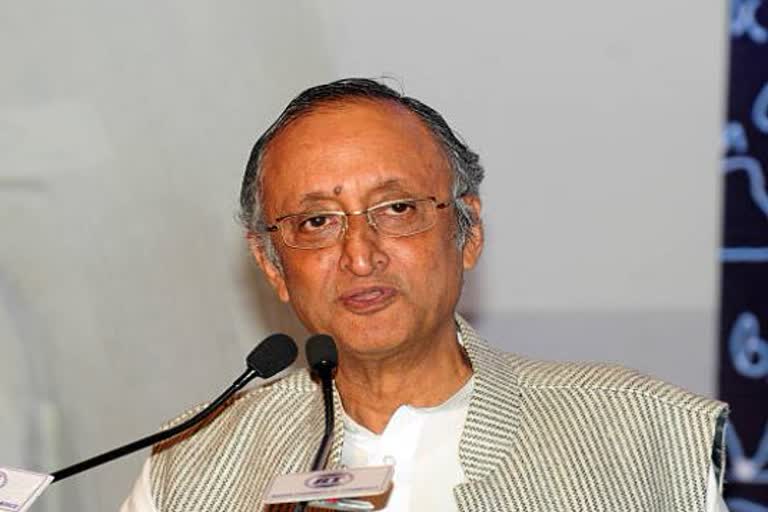Kolkata: West Bengal Finance Minister Amit Mitra on Sunday said that the Centre's suggestion to states to borrow for meeting the shortfall in revenue from Goods and Services Tax (GST) is "totally unacceptable" as it would destroy their financial health and lead to "brute power of centralism.
In the 41st meeting of GST council on August 27, Union Finance Minister Nirmala Sitharaman said that the COVID-19 pandemic is an "act of God" which has hit GST collection and ruled out paying compensation to states from its coffers.
In the name of "act of God", a huge debt is being thrust on states which will destroy their financial health and federalism will be crushed giving rise to "brute power of centralism," Mitra said.
"We find it totally unacceptable," Mitra said at a virtual news conference.
He claimed that 15 big states, including some BJP-ruled ones, objected to Sitharaman's suggestion and said that the Centre should borrow instead.
Mitra said that the founder of GST Network Nandan Nilekani earlier made a statement before the GST Council that total revenue loss due to fraudulent transactions is Rs 70,000 crore.
"So is this an act of God or an act of fraud?" the West Bengal finance minister asked.
Mitra said that Sitharaman on March 14 before COVID had said that the Centre is duty-bound to compensate the states.
Read more:Covid Blues: Q1FY21 GDP contraction range seen from 17-30%; clamour for stimulus grows
"Now they are saying just the opposite. This is totally subterfuge," he added.
According to him, if the states go and borrow, the yields will be affected.
"Why the Centre is not borrowing directly? The Centre can monetise debt by printing money which the states cannot," he said.
Mitra said that RBI had even said that the Centre can borrow from the window of the apex bank directly.
As per the Centre's calculations, the compensation requirement of states in current fiscal would be Rs 3 lakh crore, of which Rs 65,000 crore would come from levy of cess.
Out of the shortfall of Rs 2.35 lakh crore, the shortfall due to GST implementation is Rs 97,000 crore and the remaining is due to COVID-19 impact.
The Centre has given two options to states -- to either borrow the entire Rs 2.35 lakh crore or borrow only Rs 97,000 crore through a special window, which would be provided by the RBI, to meet the revenue shortfall.
Mitra said that the Fiscal Responsibility and Budget Management (FRBM) limit has not been relaxed and thus, unlike the Centre, states do not have the headroom to borrow.
He said that West Bengal was already having a revenue shortfall of Rs 15,000 crore and exhausted the FRBM limit.
"We hope to have a collective decision on this matter very soon and seek more clarity from the Centre," Mitra said.
GST council needs to work out mid-way solution for settling revenue shortfall issue: Sushil Modi
The relation between the Centre and states is not that of 'giver and taker' and the GST Council will have to work out a mid way solution for making good the GST collection shortfall keeping in mind the central government too is bearing huge revenue loss due to COVID-19, Bihar Deputy Chief Minister Sushil Modi has said.
Non-BJP ruled states like Punjab, Kerala, Delhi and West Bengal are at loggerheads with the Centre over the financing of the Rs 2.35 lakh crore Goods and Services Tax (GST) shortfall in the current fiscal.
Of this, about Rs 97,000 crore is on account of GST implementation and rest Rs 1.38 lakh crore is the impact of COVID-19 on states' revenues.
Talking to PTI, Modi said both the central government and states are stakeholders in GST and instead of playing a 'blame game', states should also consider that apart from the pandemic, the Centre is also facing challenges on the defence side which needs higher spending.
"It is not that only states' revenues have been affected, central government's revenue too is constrained and a huge borrowing by the Centre would have macro-economic impact.
"The relation between the Centre and states is not that of 'giver and taker', we have to keep the spirit of cooperative federalism in mind and work out a mid way (solution)," said Modi, who also holds the finance portfolio in the coalition government of BJP, JD(U) and LJP in Bihar.
Asked which option would be better for Bihar, Modi said prima facie the first option of borrowing Rs 97,000 crore looks attractive, but the state would study in detail and then make a final decision.
He said in this option while states can borrow the remaining Rs 1.38 lakh crore to meet their immediate needs, and the principal amount would be repaid later from cess collection.
Explaining the option further, Modi said the compensation cess will be continued after the transition period until such time as all arrears of compensation for the transition period are paid to the states.



